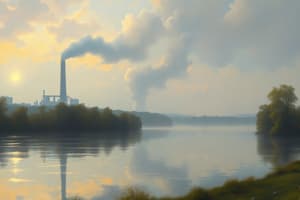Podcast
Questions and Answers
Flashcards are hidden until you start studying
Study Notes
Pollution Overview
- Pollution is environmental contamination by waste, chemicals, and harmful substances.
- Major forms of pollution include air, water, and land pollution.
Air Pollution
- Key contributors: wildfires, volcanoes, industrial chemicals, and primarily the burning of fossil fuels (coal, oil, natural gas).
- Sources of fossil fuel combustion: factories, electrical plants, automobiles.
- Air pollution can release solid particles (ash and soot) and harmful gases, leading to:
- Smog, characterized by hazy air that impairs visibility.
- Health issues such as cancer and asthma.
- Acid rain that damages ecosystems.
- Global warming, indicated by a gradual increase in Earth's average temperature.
- Ozone layer depletion, which protects Earth from harmful solar radiation.
Water Pollution
- Visible causes include the dumping of garbage and sewage into water bodies (creeks, rivers, lakes, oceans).
- Industries may discharge oils and toxic chemicals into water sources.
- Indirect causes include agricultural practices:
- Chemicals used as fertilizers can poison groundwater.
- Pesticides and herbicides can contaminate surface water, threatening aquatic life.
Land Pollution
- Littering is a direct and visible form of land pollution that disrupts habitats for flora and fauna.
- Chemical pollution from agriculture and industries can accumulate in soil:
- Contamination can affect plants and animals and pose health risks to humans who consume them.
Pollution Control Measures
- Governments, environmental organizations, and individuals are actively combating pollution.
- Legislative efforts aim to prevent the release of hazardous chemicals into the environment.
- Transitioning to renewable energy sources (solar, wind, hydro) reduces reliance on fossil fuels.
- Community recycling initiatives help minimize waste and promote sustainable material use.
Pollution Overview
- Pollution is environmental contamination by waste, chemicals, and harmful substances.
- Major forms of pollution include air, water, and land pollution.
Air Pollution
- Key contributors: wildfires, volcanoes, industrial chemicals, and primarily the burning of fossil fuels (coal, oil, natural gas).
- Sources of fossil fuel combustion: factories, electrical plants, automobiles.
- Air pollution can release solid particles (ash and soot) and harmful gases, leading to:
- Smog, characterized by hazy air that impairs visibility.
- Health issues such as cancer and asthma.
- Acid rain that damages ecosystems.
- Global warming, indicated by a gradual increase in Earth's average temperature.
- Ozone layer depletion, which protects Earth from harmful solar radiation.
Water Pollution
- Visible causes include the dumping of garbage and sewage into water bodies (creeks, rivers, lakes, oceans).
- Industries may discharge oils and toxic chemicals into water sources.
- Indirect causes include agricultural practices:
- Chemicals used as fertilizers can poison groundwater.
- Pesticides and herbicides can contaminate surface water, threatening aquatic life.
Land Pollution
- Littering is a direct and visible form of land pollution that disrupts habitats for flora and fauna.
- Chemical pollution from agriculture and industries can accumulate in soil:
- Contamination can affect plants and animals and pose health risks to humans who consume them.
Pollution Control Measures
- Governments, environmental organizations, and individuals are actively combating pollution.
- Legislative efforts aim to prevent the release of hazardous chemicals into the environment.
- Transitioning to renewable energy sources (solar, wind, hydro) reduces reliance on fossil fuels.
- Community recycling initiatives help minimize waste and promote sustainable material use.
Studying That Suits You
Use AI to generate personalized quizzes and flashcards to suit your learning preferences.




